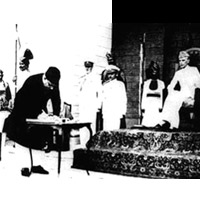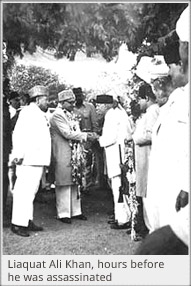Past Your Converted Adsense Code
NAWABZADA LIAQUAT ALI KHAN
 Nawabzada
Liaquat Ali Khan was born at Karnal, Haryana in 1895. He was the son of
Rukunuddaulah Sharnsher lung Nawab
Rustarn Ali Khan, the Nawab of Karnal.
He did his graduation in 1918 from MAO College, Aligarh and went to
Exeter College, Oxford in 1922 and then Inner Temple for his Bat-at-Law
in 1922. On his return to India in
1923, he joined the All India Muslim
League. Nawabzada
Liaquat Ali Khan was born at Karnal, Haryana in 1895. He was the son of
Rukunuddaulah Sharnsher lung Nawab
Rustarn Ali Khan, the Nawab of Karnal.
He did his graduation in 1918 from MAO College, Aligarh and went to
Exeter College, Oxford in 1922 and then Inner Temple for his Bat-at-Law
in 1922. On his return to India in
1923, he joined the All India Muslim
League.
Mr.
Liaquat Ali Khan was a Member of the United Provinces Legislative
Council from t926-1940. He was elected Deputy
President of the United Provinces
Legislative Council and held that office for six years. He was also
Leader of the Democratic Party of the Council.
In
1937, he went to London as a Member of the Indo-British Trade
Delegation. When Quaid-e-Azam Mohammad A1i Jinnah reorganised the
All India Muslim League in 1936, Mr.
Liaquat Ali Khan was elected its Honorary General Secretary. In 1940, he
was elected to the Central Legislative Assembly and became the Deputy
Leader of the Muslim
League. He entered into an agreement
with Bhulabai Desai on the question of representation in the Interim
Government known as 'LIAQUAT-DESAIPACT.1945'.
In
1946 he was appointed as a Member of the Governor General's Executive
Council and the Leader of the Muslim League Party in the Indian Interim
Government. He held the portfolio of
Finance, being the first Indian Finance Minister. The Budget for 1947-48
which he presented was acclaimed throughout the Country as a 'Poor
man's Budget'.
Liaquat
Ali Khan attended the Simla conference on behalf of the Muslim
League in 1945 and 1946. He was one of
the most prominent of the All India Muslim League Leaders and one of the
most trusted Lieutenants of Quaid-e-Azam Mohammad Ali Jinnah. He was
Muslim League Delegate to
All Parties Convention at Calcutta in
December 1928. He was elected Secretary, All India Muslim League in 1936
and re-elected in 1938, 1940, 1941, 1942 and 1943. He was Member of the
League Central Parliamentary
Board in 1936. He moved a resolution
regarding certain amendments in League Constitution in its historic 27th
Session at Lahore in March 1940. he was Convener, Action Committee of
the League and Member Parliamentary
Board in 1943; he was also a Member
Subjects Committee League's Legislator's Convention held at Delhi in
April 1945.
On
August 14, 1947, he became the first Prime Minister and the Minster of
Defence of the new Dominion of Pakistan.
He wielded effective power and provided dynamic leadership to Pakistan
during the most crucial phase of its
history. He signed the "LIAQUAT-NEHRU
PACT” in 1950 in New Delhi on the problem of minorities. He was the Vice
Chairman, Basic Principles'
Committee of the Constituent Assembly in
March 1949, which submitted its report in 1950.
He
died at the hands of an assassin on October 16. 1951 while addressing a
public meeting at Rawalpindi and was buried in the courtyard of the
Quaid-e-Azam's mausoleum.
|
|||||||||||

Being the first Prime Minister of the country, Liaquat Ali Khan had to deal with a number of difficulties that Pakistan faced in its early days. He helped Quaid-i-Azam in solving the riots and refugee problem and in setting up an effective administrative system for the country. He established the groundwork for Pakistan’s foreign policy. He also took steps towards the formulation of the constitution. He presented The Objectives Resolution, a prelude to future constitutions, in the Legislative Assembly. The house passed it on March 12, 1949. It is considered to be the “Magna Carta” in Pakistan’s constitutional history. Liaquat Ali Khan called it “the most important occasion in the life of this country, next in importance, only to the achievement of independence”. Under his leadership a team also drafted the first report of the Basic Principle Committee and work began on the second report. During his tenure, India and Pakistan agreed to resolve the dispute of Kashmir in a peaceful manner through the efforts of the United Nations. According to this agreement a ceasefire was affected in Kashmir in January 1948. It was decided that a free and impartial plebiscite would be held under the supervision of the UN.
After
the death of Quaid-i-Azam, he tried to fill the vacuum created by the
departure of the Father of the Nation. The problem of religious
minorities flared during late 1949 and early 1950, and it seemed as if
India and Pakistan were about to fight their second war in the first
three years of their independence. At this critical moment in the
history of South Asia, Prime Minister Liaquat Ali Khan met Nehru to sign
the Liaquat-Nehru Pact in 1950. The Liaquat-Nehru Pact was an effort on
his part to improve relations and reduce tension between India and
Pakistan. In May 1951, he visited the United States and set the course
of Pakistan’s foreign policy towards closer ties with the West. An
important event during his premiership was the establishment of National
Bank of Pakistan in November 1949, and the installation of a paper
currency mill in Karachi.
Liaquat Ali Khan was unfortunately assassinated on October 16, 1951.
Security forces immediately shot the assassin, who was later identified
as Saad Akbar. The question of who was behind his murder is yet to be
answered.The government officially gave Liaquat Ali Khan the title of Shaheed-i-Millat.  00 01 02 03 04 05 06 07 08 09 |
|||||||||||










0 comments:
Post a Comment